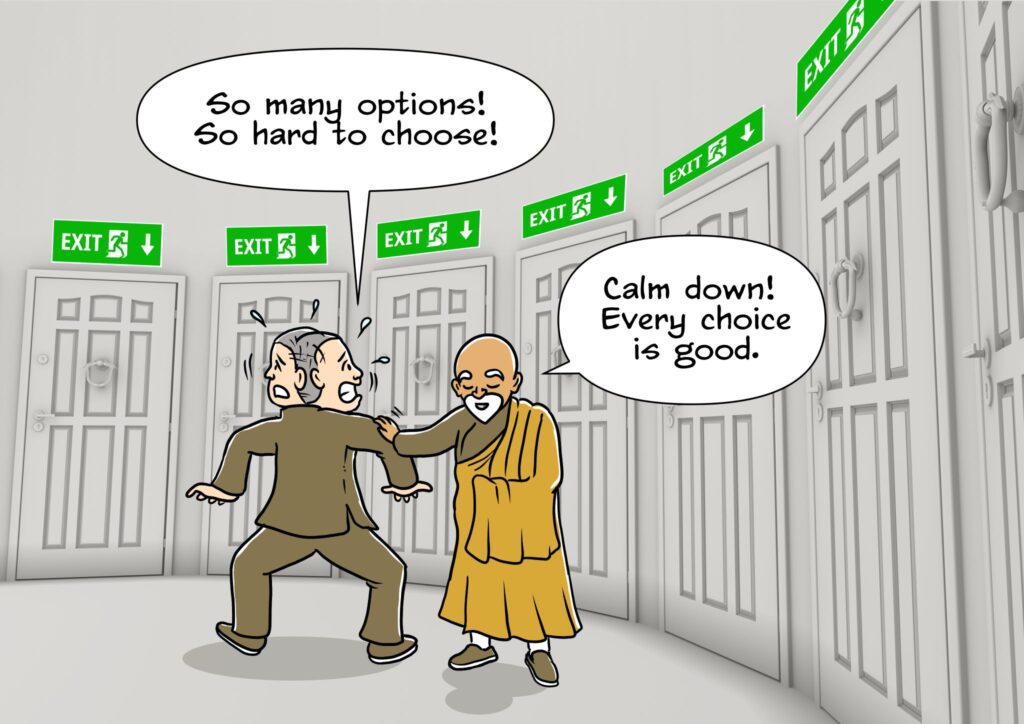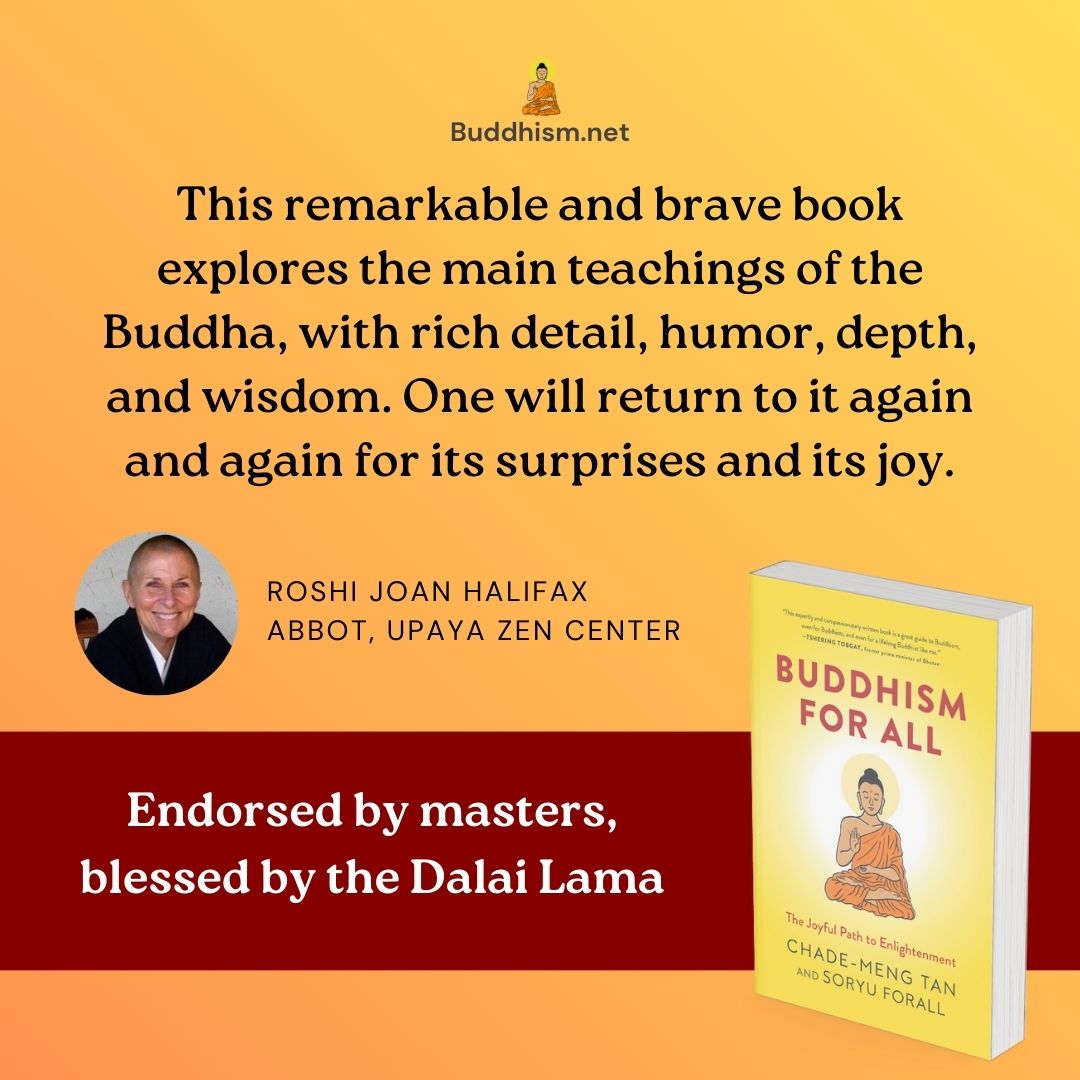(Context: Dependent Origination.)
The most important thing about the teaching on dependent origination is it provides the answer to how to end suffering. If your understanding of dependent origination does not lead to ending suffering, then you are missing the entire point.
The way to break suffering is surprisingly straightforward: there are strategic nodes in the dependent origination web that you can work on, and through any one of them, you can break ignorance. Once ignorance is broken, the entire causation web comes crashing down and suffering is ended. It is a little bit like trying to destroy the Death Star in the first Star Wars movie. The way to destroy the Death Star is to blow up its reactor core, and one way to reach the reactor core is via a thermal exhaust port. That is why if you can fire even a single proton torpedo into a thermal exhaust port, you can take down the entire Death Star. Hence, the almost intractable problem of destroying the Death Star is reduced to the still-challenging but much easier problem of clearing your way to a thermal exhaust port and firing a proton torpedo into it.
In the case of ending ignorance and suffering, the most powerful access point is craving. Craving is something you can take direct action on and, as we stated in the previous post, once you weaken craving, you directly weaken the five hindrances, which then directly weakens ignorance, which in turn further weakens craving. You then ride that virtuous cycle until ignorance is destroyed, and then suffering ends. Soryu explains it in a complementary way: as you reduce craving more and more, you eventually reach a point where there is not enough craving to sustain ignorance. When that happens, ignorance breaks enough for you to clearly see that craving causes suffering. That motivates you to reduce craving even more. Eventually, with the complete elimination of craving, there is also the complete elimination of ignorance and the end of suffering.
What is the Buddha’s teaching on ending suffering by breaking craving? That is right, it is the Four Noble Truths! In that sense, the Four Noble Truths can be seen as one derivative of dependent origination, albeit the most concise, most understandable, most practicable and most powerful one, which is why the Buddha emphasized it so much and so often.[1]
This insight answers a question that vexes almost every sincere Buddhist student I know. See, in the Four Noble Truths, the Buddha teaches that craving causes suffering but in dependent origination, he teaches that ignorance causes suffering. Which is it? Dammit, which is it? Once you understand the intimate, co-dependent relationship between craving and ignorance, you can clearly see for yourself that the answer is: both.
Craving is not the only access point, the Buddha also spoke about others. For example, in the Discourse on the Observation of Dualities[2], the Buddha stated that, “Whatever suffering arises, all is caused by grasping. With the complete ending of all grasping there is no arising of suffering.” He then stated the same regarding ignorance, consciousness, contact, sensation, craving, and other mental phenomena. The complete ending of any one of those things leads to the end of suffering.
Occasionally, the Buddha gave an entire discourse focusing on a single access point as the way to end suffering. For example, this is an entire discourse:
Monks, there are these three sensations: pleasant, painful, neither-painful-nor-pleasant.
A disciple of the Buddha, mindful,
Concentrated, comprehending clearly,
Understands sensations
And the origin of sensations,
Where they finally cease,
And the path leading to their destruction.
With the destruction of sensations
A monk is hungerless and fully quenched. [3]
One key lesson here is the same one you encounter over and over in the study of Buddhism: there are many doors to liberation. There are many legitimate and effective doorways to the ending of ignorance and suffering. Hence, if you encounter a discourse that says, “This is the way out,” and another that says, “That is the way out,” know that they are not mutually exclusive. They are like the green “exit” signs surrounding the cinema, every one of them points to a legitimate way out. As long as it eventually ends ignorance, it is legit.

Dependent origination is one of the most important teachings in Buddhism. It can even be said that dependent origination encapsulates all of Buddhism. Sāriputta quoted the Buddha as saying that, “One who sees dependent origination sees the Dharma; one who sees the Dharma sees dependent origination.”[4] Dependent origination is a teaching that is profound and complete enough that if you understand it fully, you can derive the rest of Dharma, including its most important and most powerful derivative: the Four Noble Truths. Now you have learned both. You are so lucky.
Activities
- Reflect on this post with Angela: There are many different methods or practices that you may observe Buddhists do. These include meditation, chanting, prostrating, and the practice of dana or generosity. They are all different doors to enter and cultivate to awaken to the deathless. So, which method is best? There is no ultimate best method. There is only the best method, for you. What insights, learning, or reflection came up for you from this article?
References
[1] As an example, in Saṃyutta Nikaya 12.43, even though multiple links of dependent origination are mentioned, the “remainderless fading away and cessation of craving” is identified as the first step in ending suffering.
[2] Sutta Nipata 3.12.
[3] Saṃyutta Nikaya 36.1. Bhikkhu Bodhi’s translation, except I changed vedanā from feeling to sensation, and translated bhikkhus to monks, to match the rest of this book.
[4] Majjhima Nikāya 28.

